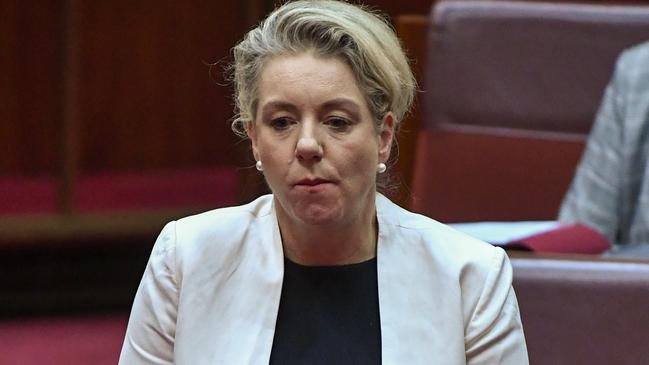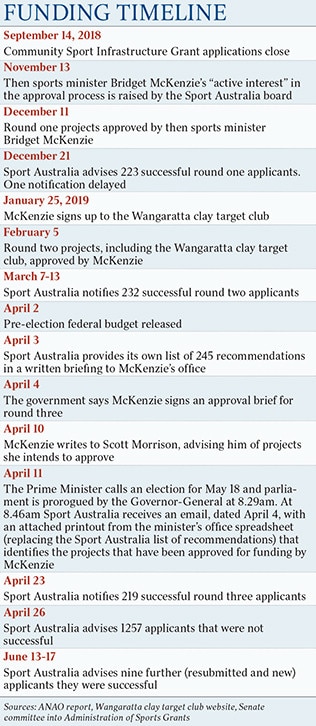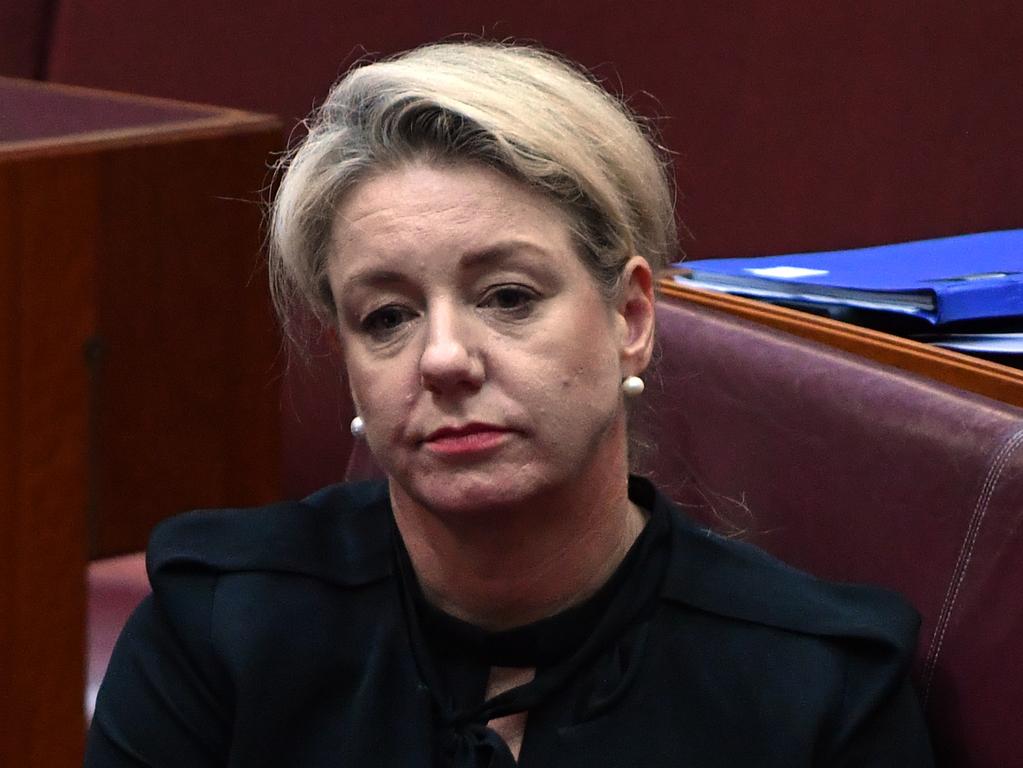Sports rorts row focuses on 16 minutes after poll called
Scott Morrison has defended an email received from Bridget McKenzie a day before the election was called, advising him of projects she ‘intended to approve’.

It was the day the political saga ignited by the government’s controversial $100 million sports grants scheme descended into a debate over timing.
At 8:46am on April 11 — the day the election was called — then deputy Nationals leader Bridget McKenzie sent Sport Australia a brief approving funding for 228 community infrastructure projects.
But Labor argues the email and attached spreadsheet identifying the approved projects were sent 16 minutes too late.
At 8:30 that morning, the parliament had been prorogued and the House was dissolved as the nation was flung into an election campaign.
On April 10 — one day before the election was called — Senator McKenzie had also written to Scott Morrison advising him of the projects she “intended to approve.”
Anthony Albanese seized on the new evidence — emerging from a Senate probe into the sports rorts affair — to renew his attack on Scott Morrison and try and link the Prime Minister’s office to the affair.
“Why, then, on the day before he called the election did the Prime Minister obtain a colour-coded spreadsheet from Senator McKenzie with projects she intended to approve, listed by party and electorate?” Mr Albanese told parliament.
Mr Morrison moved swiftly to blunt the attack, countering that the proper authorisation for the grants had actually been made seven days beforehand. He was relying on evidence from the Senate inquiry to make the argument.
While Senator McKenzie did not send Sport Australia an approval brief for grant funding until April 11, the brief was actually dated April 4 — a whole week earlier.
Mr Morrison also argued that Senator McKenzie had made the final decisions on which projects were funded and repeatedly defended the email he received from his former sport minister the day before the election was called.
“There was no authorisation provided by me as Prime Minister on the projects,” Mr Morrison said. “Those authorisations were provided on 4 April, according to the approval of the brief by Senator McKenzie.”

While the government argues the approval was signed off on April 4 — and not on April 11 — Auditor-General Grant Hehir’s scathing report into the administration of the scheme stated that the funding decision for round three was finalised on April 11.
Of the 228 projects signed-off by Senator McKenzie, 73 per cent had also not been recommended by Sport Australia.
Under caretaker conventions, governments are supposed to avoid making “major” financial commitments, but there is discretion as to what constitutes a major undertaking.
Constitutional law expert Anne Twomey, who last week made a submission to the Senate inquiry in which she raised questions regarding the legality of the controversial program, told The Australian the new evidence cast further doubt about the “appropriateness” of the process. Professor Twomey said Prime Minister and Cabinet guidelines stated that, while caretaker conventions only applied to the making of major policy decisions, not announcements, it was still unclear whether Senator McKenzie had legally made the decision before or after the election had been called.
Mr Morrison has also faced renewed scrutiny after it emerged 136 emails about the grant scheme were sent between his office and that of Senator McKenzie.
Mr Hehir has previously told the inquiry the Prime Minister’s Office made “direct and indirect” representations on behalf of grassroots clubs applying for sporting grants but cautioned it was clear Senator McKenzie was the “decision-maker” behind the scenes.
His original explosive report found Senator McKenzie ignored recommendations by government agency Sport Australia on which applications to approve before the election without apparent legal authority, favouring marginal and targeted seats.
The inquiry also heard Sport Australia formally raised concerns regarding Senator McKenzie’s approval process on two occasions via email on December 5 2018 and again on March 5 2019.
Australian Sport Commission Chair John Wylie defended Sport Australia’s involvement, declaring the organisation assessed applications using a thorough, independent and merit-based process and it was “very clear” Senator McKenzie had the final say on who received grants. Senator McKenzie was forced to quit after she was found to have broken ministerial rules by not declaring potential conflicts of interest relating to gun club memberships.
The Australian last month revealed concerns about Senator McKenzie’s involvement in the controversial $100 million grants program were raised “consistently” from the scheme’s inception.






To join the conversation, please log in. Don't have an account? Register
Join the conversation, you are commenting as Logout